小学英语肯定句变一般疑问句讲课教案
- 格式:ppt
- 大小:126.50 KB
- 文档页数:6
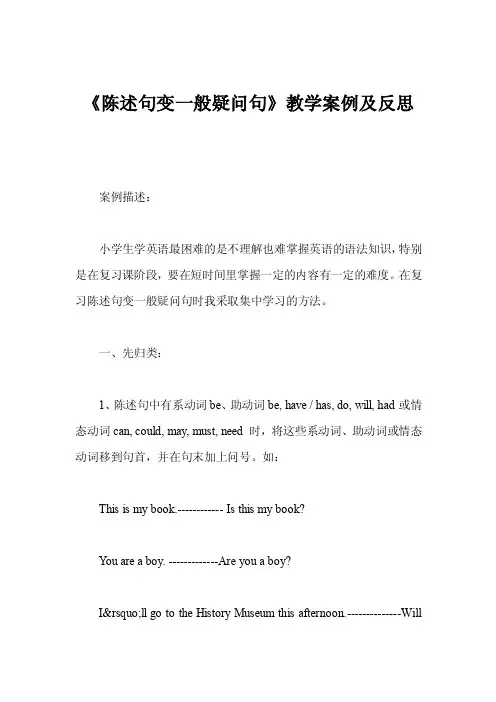
《陈述句变一般疑问句》教学案例及反思案例描述:小学生学英语最困难的是不理解也难掌握英语的语法知识,特别是在复习课阶段,要在短时间里掌握一定的内容有一定的难度。
在复习陈述句变一般疑问句时我采取集中学习的方法。
一、先归类:1、陈述句中有系动词be、助动词be, have / has, do, will, had或情态动词can, could, may, must, need 时,将这些系动词、助动词或情态动词移到句首,并在句末加上问号。
如:This is my book.------------ Is this my book?Y ou are a boy. -------------Are you a boy?I’ll go to the History Museum this afternoon.--------------Willyou go to the History Museum this afternoon?2、原陈述中没有系动词be、助动词,则在句首加助动词Do的适当形式,同时,将谓语动词变为原形动词。
如:I want to go to Guilin.--------Do you want to go to Guilin?The boy does some housework at home.-- Does the boy do some housework at home?3、原陈述句中,若谓语动词是have / has, 则须考虑have / has 的意义。
如果have / has是有的意义时,变为疑问句时,既可在句首加Do的适当形式,也可将have / has,提到句首。
如:He has a beautiful pen. —Has he a beautiful pen? / Does he have a beautiful pen?<<<12>>>。
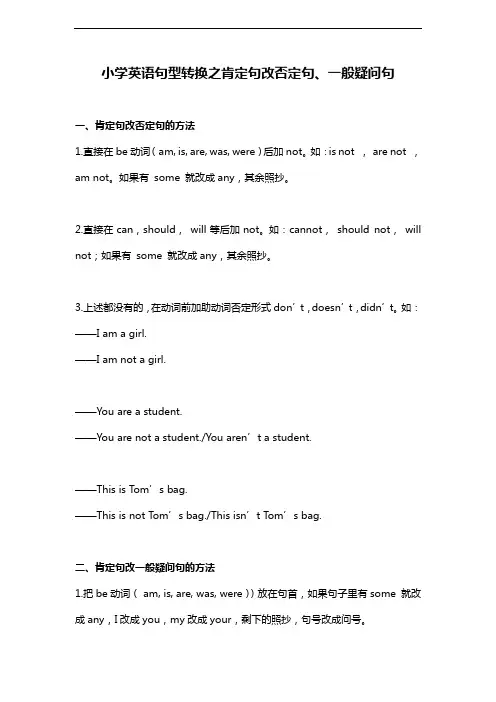
小学英语句型转换之肯定句改否定句、一般疑问句一、肯定句改否定句的方法1.直接在be动词(am, is, are, was, were)后加not。
如:is not ,are not ,am not。
如果有some 就改成any,其余照抄。
2.直接在can,should,will等后加not。
如:cannot,should not,will not;如果有some 就改成any,其余照抄。
3.上述都没有的,在动词前加助动词否定形式don’t,doesn’t,didn’t。
如:——I am a girl.——I am not a girl.——You are a student.——You are not a student./You aren’t a student.——This is Tom’s bag.——This is not Tom’s bag./This isn’t T om’s bag.二、肯定句改一般疑问句的方法1.把be动词( am, is, are, was, were))放在句首,如果句子里有some 就改成any,I改成you,my改成your,剩下的照抄,句号改成问号。
2.把can,shall,will,would,should ,could,may ,must等放到句首,如果句子里有some 就改成any,I就改成you,my就改成your,剩下的照抄,句号改成问号。
3.上述都没有的,就在句首加助动词Do,Does,Did帮忙,如果句子里有some 就改成any,I就改成you,my就改成your,剩下的照抄,句号改成问号。
4.注意:句首的第一个字母要大写,句尾标点应为“?”。
变一般疑问句时,肯定句是I am …,就把I am …变成Are you …?变一般疑问句时,肯定句I was …,就把I was …变成Were you …?如:——I am in Class 6.——Are you in Class 6?——You are from America.——Are you from America?——It is an orange.——Is it an orange?5.就一般疑问句回答一般疑问句有两种回答,即:肯定回答和否定回答。
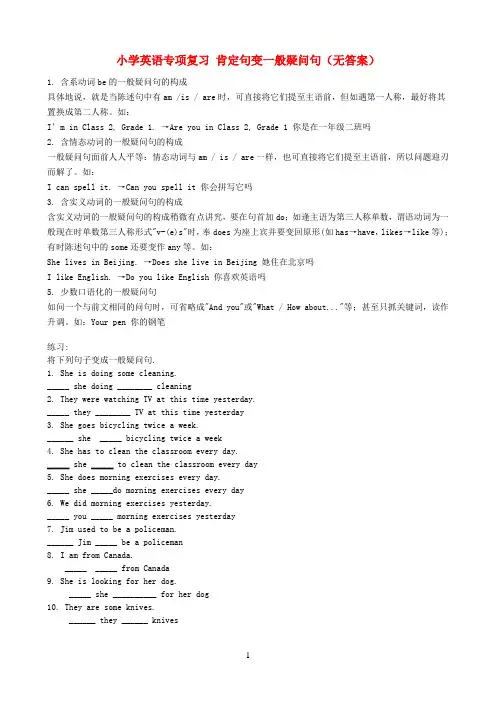
小学英语专项复习肯定句变一般疑问句(无答案)1. 含系动词be的一般疑问句的构成具体地说,就是当陈述句中有am /is / are时,可直接将它们提至主语前,但如遇第一人称,最好将其置换成第二人称。
如:I’m in Class 2, Grade 1. →Are you in Class 2, Grade 1 你是在一年级二班吗2. 含情态动词的一般疑问句的构成一般疑问句面前人人平等:情态动词与am / is / are一样,也可直接将它们提至主语前,所以问题迎刃而解了。
如:I can spell it. →Can you spell it 你会拼写它吗3. 含实义动词的一般疑问句的构成含实义动词的一般疑问句的构成稍微有点讲究,要在句首加do;如逢主语为第三人称单数,谓语动词为一般现在时单数第三人称形式"v-(e)s"时,奉does为座上宾并要变回原形(如has→have,likes→like等);有时陈述句中的some还要变作any等。
如:She lives in Beijing. →Does she live in Beijing 她住在北京吗I like Engli sh. →Do you like English 你喜欢英语吗5. 少数口语化的一般疑问句如问一个与前文相同的问句时,可省略成"And you"或"What / How about..."等;甚至只抓关键词,读作升调。
如:Your pen 你的钢笔练习:将下列句子变成一般疑问句.1. She is doing some cleaning._____ she doing ________ cleaning2. They were watching TV at this time yesterday._____ they ________ TV at this time yesterday3. She goes bicycling twice a week.______ she _____ bicycling twice a week4. She has to clean the classroom every day._____ she _____ to clean the classroom every day5. She does morning exercises every day._____ she _____do morning exercises every day6. We did morning exercises yesterday._____ you _____ morning exercises yesterday7. Jim used to be a policeman.______ Jim _____ be a policeman8. I am from Canada._____ _____ from Canada9. She is looking for her dog._____ she __________ for her dog10. They are some knives.______ they ______ knives1。
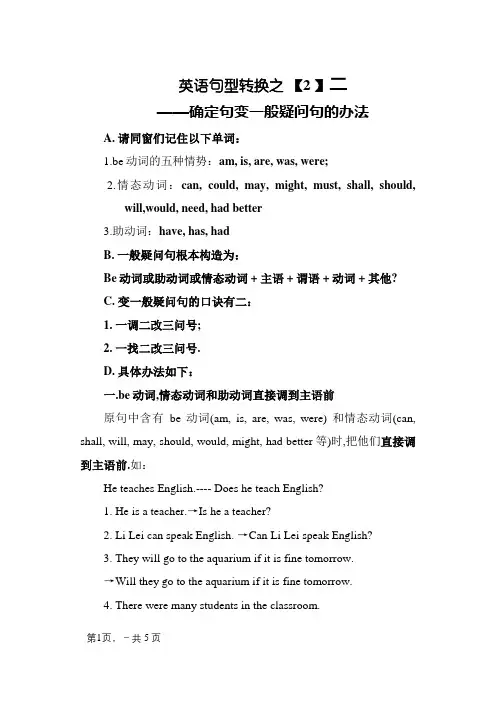
英语句型转换之【2 】二——确定句变一般疑问句的办法A. 请同窗们记住以下单词:1.be动词的五种情势:am, is, are, was, were;2.情态动词:can, could, may, might, must, shall, should,will,would, need, had better3.助动词:have, has, hadB. 一般疑问句根本构造为:Be动词或助动词或情态动词 + 主语 + 谓语 + 动词 + 其他?C. 变一般疑问句的口诀有二:1. 一调二改三问号;2. 一找二改三问号.D. 具体办法如下:一.be动词,情态动词和助动词直接调到主语前原句中含有be动词(am, is, are, was, were) 和情态动词(can, shall, will, may, should, would, might, had better等)时,把他们直接调到主语前.如:He teaches English.---- Does he teach English?1. He is a teacher.→Is he a teacher?2. Li Lei can speak English. →Can Li Lei speak English?3. They will go to the aquarium if it is fine tomorrow.→Will they go to the aquarium if it is fine tomorrow.4. There were many students in the classroom.→Were there many students in the classroom?二.原句中没有be动词.助动词或情态动词时,要依据下面不同情形在主语前加助动词do, does, did.1. 句中第一个动词是本相时,在主语前加上do.如:I get to school at six o'clock every day.→Do you get to school at six o'clock every day?2. 句中第一个动词是三单情势时,在主语前加上does,本来的动词三单情势改为动词本相.如:He teaches English.→Does he teach English?3. 句中第一个动词是曩昔式时,在主语前加上did,本来的动词曩昔式改为动词本相.如:The children had a good time in the park last night.→Did the children have a good time in the park last night?三.确定句变一般疑问句的几点留意1. 确定句变一般疑问句时,除上述变化外,句中其他词语也可能随之转变,如将some改为any,something改为anything, my改为your, I改为you,already.still改为yet等.如:There are some apples in the tree..→Are there any birds in the tree?The dentisthas already seen the moive.→Has the dentist seen the moive yet?2. 须要分清do, does, did, have, has, have, had等是实义动词照样助动词.假如是助动词,则把它们直接调到主语前,假如是实义动词,则在主语前面依据现实情形加do, does或did.如:Mary usually does some readingon Saturdays.→Does Mary usually any readingon Saturdays?(Wrong)→Does Mary usually do any readingon Saturdays?(Right)I have taught English here for two years→Do you have taught English here for two years?(Wrong)→Have you taught English here for two years?(Right)演习题一.填空,把下面的句子变成一般疑问句:1. She is doing some cleaning._____ she doing ________ cleaning?2. They were watching TV at this time yesterday._____ they ________ TV at this time yesterday?3. She goes bicycling twice a week.______ she _____ bicycling twice a week?4. She has to clean the classroom every day._____ she _____ to clean the classroom every day?5. She does morning exercises every day._____ she _____do morning exercises every day?6. We did morning exercises yesterday._____ you _____ morning exercises yesterday?7. The policeman told the boys not to play football in the street. (甘肃省中考题)______ the policeman ______ the boys not to play football in the street?8. I am from Canada._____ _____ from Canada?9. She is looking for her dog._____ she __________ for her dog?10. They are some knives.______ they ______ knives?11.Maria does sports every day._____ Maria _____ sports every day?12. I would like to go with you.______ you ______ to go with me?二.用do,does,be 填空1. _____ she know all the answers ?Yes , she ____ . /No, she _____.2 ._____ the twins often fight ?3. _____ your dad like listening to music?Yes , he ____ . / No, he_____.4._____ uncle Tom wash his car everyday?5. _____ you have a new teacher?Yes , I ______. No, I ______.6._____ she a teacher?Yes, she _____ . No, she _____.7. ______ you playing ball now?Yes, I ______. No, I ______.8. ______ the pig like to sleep?Yes, it ______. No, it _____.9. ______ five birds flying in the sky?Yes, they _____ .No, ____ aren’t.10. _____ your father smoking in the living room? Yes, ____ is .No, he _____.。
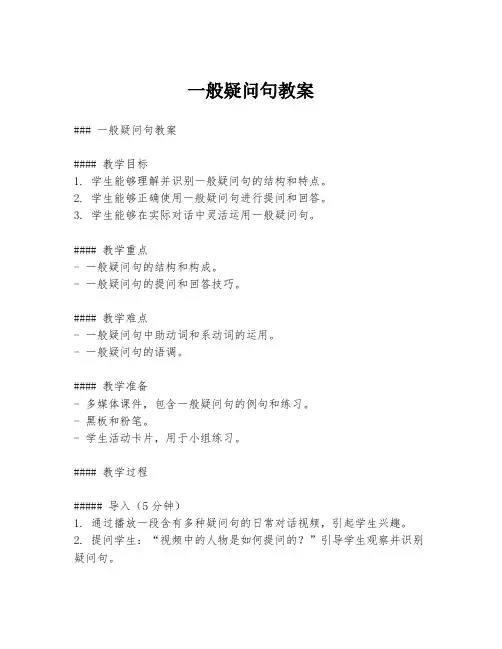
一般疑问句教案### 一般疑问句教案#### 教学目标1. 学生能够理解并识别一般疑问句的结构和特点。
2. 学生能够正确使用一般疑问句进行提问和回答。
3. 学生能够在实际对话中灵活运用一般疑问句。
#### 教学重点- 一般疑问句的结构和构成。
- 一般疑问句的提问和回答技巧。
#### 教学难点- 一般疑问句中助动词和系动词的运用。
- 一般疑问句的语调。
#### 教学准备- 多媒体课件,包含一般疑问句的例句和练习。
- 黑板和粉笔。
- 学生活动卡片,用于小组练习。
#### 教学过程##### 导入(5分钟)1. 通过播放一段含有多种疑问句的日常对话视频,引起学生兴趣。
2. 提问学生:“视频中的人物是如何提问的?”引导学生观察并识别疑问句。
##### 新课呈现(15分钟)1. 讲解一般疑问句的定义和特点,强调其以疑问词开头,句尾用升调。
2. 展示一般疑问句的结构,如“Are you a student?”和“Do youlike apples?”3. 通过课件展示不同助动词和系动词构成的一般疑问句,如“Does she work here?”和“Is he your brother?”4. 让学生跟读例句,注意模仿正确的语调。
##### 操练(20分钟)1. 分组活动:每组学生抽取活动卡片,上面有不同的一般疑问句,学生需要回答卡片上的问题。
2. 角色扮演:学生分组,模拟不同的场景(如在餐厅点餐、询问路等),使用一般疑问句进行对话。
3. 快速问答:教师快速提问,学生抢答,增加课堂互动性和趣味性。
##### 巩固(10分钟)1. 完成课件中的填空题和选择题,巩固一般疑问句的结构和用法。
2. 学生两两一组,互相出题,使用一般疑问句进行问答。
##### 总结(5分钟)1. 回顾本课所学的一般疑问句的结构和用法。
2. 强调一般疑问句在实际交流中的重要性。
#### 作业布置- 完成课后练习册中关于一般疑问句的练习题。
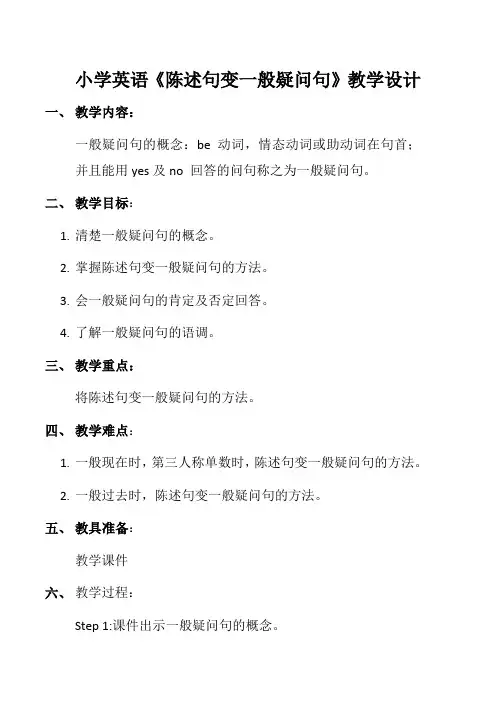
小学英语《陈述句变一般疑问句》教学设计一、教学内容:一般疑问句的概念:be 动词,情态动词或助动词在句首;并且能用yes及no 回答的问句称之为一般疑问句。
二、教学目标:1.清楚一般疑问句的概念。
2.掌握陈述句变一般疑问句的方法。
3.会一般疑问句的肯定及否定回答。
4.了解一般疑问句的语调。
三、教学重点:将陈述句变一般疑问句的方法。
四、教学难点:1.一般现在时,第三人称单数时,陈述句变一般疑问句的方法。
2.一般过去时,陈述句变一般疑问句的方法。
五、教具准备:教学课件六、教学过程:Step 1:课件出示一般疑问句的概念。
1.be动词am,is,are,was,were,情态动词can,may,must等,表示将来的will,以及助动词do,does,did在句首的句子。
2.能用yes,no回答的问句。
设计意图:让学生初步了解一般疑问句的结构,并且深刻认识一般疑问句的特点。
Step 2:课件出示问题,让学生讨论1 .Is she a student ?2. Are you a girl ?3. Can she do any kung fu ?4 .Will he go home ?设计意图:通过概念的了解,让学生判断一个句子是否是一般疑问句。
Step3:课件出示变一般疑问句的方法(一)含有be 动词及情态动词的陈述句,用“提”的方法。
1.It is white .-------Is it white ?(be动词is提句首,句号变问号,其余照罗)2 .I am Mike . ----------Are you Mike ?(第一人称变第二人称,句号变问号)3. I can dance .-------Can he dance ? (情态动词can提句首,句号变问号)4.I can sing .-----Can you sing ? (情态动词can 提句首,第一人称变第二人称)(二)含实意动词的陈述句用“借”的方法。
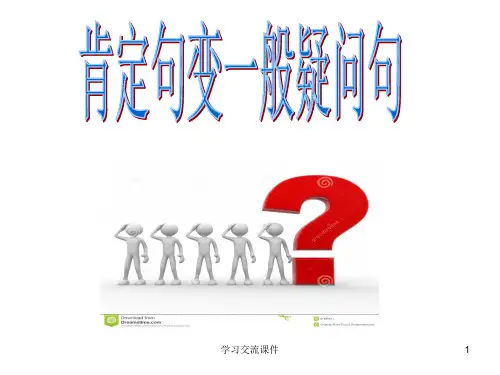
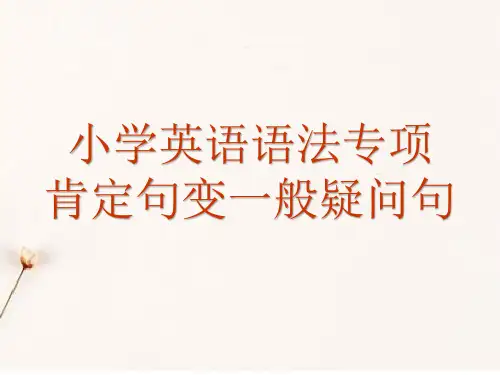
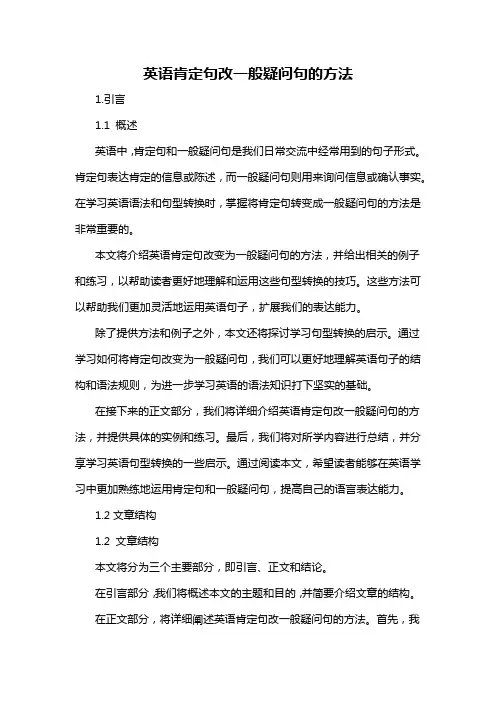
英语肯定句改一般疑问句的方法1.引言1.1 概述英语中,肯定句和一般疑问句是我们日常交流中经常用到的句子形式。
肯定句表达肯定的信息或陈述,而一般疑问句则用来询问信息或确认事实。
在学习英语语法和句型转换时,掌握将肯定句转变成一般疑问句的方法是非常重要的。
本文将介绍英语肯定句改变为一般疑问句的方法,并给出相关的例子和练习,以帮助读者更好地理解和运用这些句型转换的技巧。
这些方法可以帮助我们更加灵活地运用英语句子,扩展我们的表达能力。
除了提供方法和例子之外,本文还将探讨学习句型转换的启示。
通过学习如何将肯定句改变为一般疑问句,我们可以更好地理解英语句子的结构和语法规则,为进一步学习英语的语法知识打下坚实的基础。
在接下来的正文部分,我们将详细介绍英语肯定句改一般疑问句的方法,并提供具体的实例和练习。
最后,我们将对所学内容进行总结,并分享学习英语句型转换的一些启示。
通过阅读本文,希望读者能够在英语学习中更加熟练地运用肯定句和一般疑问句,提高自己的语言表达能力。
1.2文章结构1.2 文章结构本文将分为三个主要部分,即引言、正文和结论。
在引言部分,我们将概述本文的主题和目的,并简要介绍文章的结构。
在正文部分,将详细阐述英语肯定句改一般疑问句的方法。
首先,我们将对这个方法进行概述,为读者提供一个整体的了解。
接着,我们将介绍方法一:通过句型转换来改写肯定句为一般疑问句。
在这个部分,我们将提供具体的例子和解释,以帮助读者理解和掌握这种方法。
此外,我们还将介绍方法二:通过加上疑问词来改写肯定句为一般疑问句。
同样,我们会提供实际的例子和解释,以帮助读者更好地掌握这种方法。
在结论部分,我们将对本文进行总结,并强调学习英语句型转换的重要性和启示。
我们将回顾本文的主要内容,并指出读者在学习英语句型转换时需要注意的事项和技巧,以帮助他们更好地掌握这一技能。
通过这样的文章结构,我们将全面而系统地介绍英语肯定句改一般疑问句的方法,为读者提供清晰明了的指导和帮助。
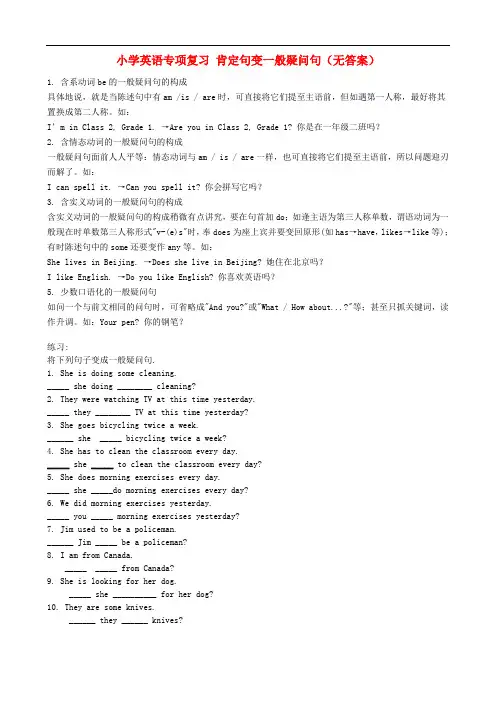
小学英语专项复习肯定句变一般疑问句(无答案)1. 含系动词be的一般疑问句的构成具体地说,就是当陈述句中有am /is / are时,可直接将它们提至主语前,但如遇第一人称,最好将其置换成第二人称。
如:I’m in Class 2, Grade 1. →Are you in Class 2, Grade 1? 你是在一年级二班吗?2. 含情态动词的一般疑问句的构成一般疑问句面前人人平等:情态动词与am / is / are一样,也可直接将它们提至主语前,所以问题迎刃而解了。
如:I c an spell it. →Can you spell it? 你会拼写它吗?3. 含实义动词的一般疑问句的构成含实义动词的一般疑问句的构成稍微有点讲究,要在句首加do;如逢主语为第三人称单数,谓语动词为一般现在时单数第三人称形式"v-(e)s"时,奉does为座上宾并要变回原形(如has→have,likes→like等);有时陈述句中的some还要变作any等。
如:She lives in Beijing. →Does she live in Beijing? 她住在北京吗?I like English. →Do you like English? 你喜欢英语吗?5. 少数口语化的一般疑问句如问一个与前文相同的问句时,可省略成"And you?"或"What / How about...?"等;甚至只抓关键词,读作升调。
如:Your pen? 你的钢笔?练习:将下列句子变成一般疑问句.1. She is doing some cleaning._____ she doing ________ cleaning?2. They were watching TV at this time yesterday._____ they ________ TV at this time yesterday?3. She goes bicycling twice a week.______ she _____ bicycling twice a week?4. She has to clean the classroom every day._____ she _____ to clean the classroom every day?5. She does morning exercises every day._____ she _____do morning exercises every day?6. We did morning exercises yesterday._____ you _____ morning exercises yesterday?7. Jim used to be a policeman.______ Jim _____ be a policeman?8. I am from Canada._____ _____ from Canada?9. She is looking for her dog._____ she __________ for her dog?10. They are some knives.______ they ______ knives?。
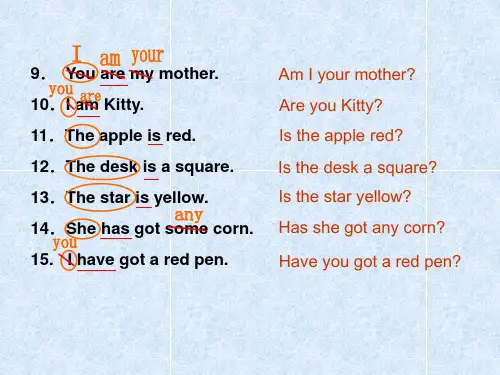
肯定句变一般疑问句课件【篇一:肯定句变一般疑问句课件】小学英语(pep)六年级上册复习课济南市青龙街小学 1.什么是一般疑问句?一般疑问句用于对某一情况提出疑问,通常可用yes或no来回答,读时用升调。
2.怎样把陈述句变成一般疑问句? yourpenpal. 这是你的笔友。
yourpenpal? 这是你的笔友吗?把句子中的be动词提前到句首。
be动词包括am 练习题:1.you universitystudent. goodfriends. smallbridge manychildren universitystudent? goodfriends? hecan go us.他能跟我们一起去。
can he go us?他能跟我们一起去吗?把句子中的情态动词提前到句首。
句子中的情态动词包括can may must。
练习题: shecan play basketball. mayhelp you. hecan sweep robotcan play chess. youlike singing. 你喜欢唱歌。
doesjim like collecting stamps? 吉姆喜欢集邮吗?如果句子中没有be动词或情态动词,就要在句首加助动词帮助其变成一般疑问句。
主语是一二人称及复数人称时加do;主语是第三人称单数形式加does。
加了does后句子中原本的动词三单形式要还原。
练习题: 1.you have hegoes shelikes apples. myfriend lives shanghai.do you have friend?does he go bus?does she like apples? do country?does your friend live shanghai?怎样把陈述句变成一般疑问句:把句子中的be动词提前到句首。
be动词包括am 把句子中的情态动词提前到句首。
句子中的情态动词包括can may must。
最新小学英语语法肯定句变一般疑问句、特殊疑问句的用法归纳总结小学语法—疑问句一、疑问句的分类疑问句就是提出疑问的句子。
分为:一般疑问句、特殊疑问句、选择疑问句和反意疑问句四种。
小学阶段不涉及反意疑问句和选择疑问句。
二、一般疑问句以Be动词,情态动词,助动词开头的疑问句,叫一般疑问句。
回答一般用“yes/no”来回答。
读的时候语音音调要上扬。
一般疑问句的结构:构成一般疑问句回答1Be动词在前Is he your father?Yes,he is/No,he isn′t Was she at home yesterday?Yes,she was/No,she wasn′t Are you at home?Yes,I am/No,I am not2情态动词在前Can you play the piano?Yes,I can/No,I can′t Could you do your homework?Yes,I can/No,I can′t3助动词在前Do you do your homework?Yes,I do/No,I don′tDoes she do her homework?Yes,she does/No,she doesn′t Did you do your homework?Yes,I did/No,I didn′tWill you do your homework?Yes,I will/No,I won′tIs she doing her homework.Yes,she is/No,she isn′t注意:回答一般疑问句时,肯定回答用“yes”,否定回答用“no”。
紧跟着的是人称(一般是代词),最后是一般疑问句的第一个词,如果是“no”否定回答还要把它加上not。
eg:Did you do your homework?你做作业了吗?Yes,I did/No,I didn′t(√)是的,我做了/不,我没有Yes,I didn′t(×)No,I did(×)Yes,I do(×)No,I doesn′t(×)三、肯定句如何变一般疑问句肯定句变一般疑问句与改成否定句窍门差不多,也是去找谓语(主要动词),再变化,遇到some要变成any。
肯定句改一般疑问句主要技巧
含有be动词(am/is/are/was/were)的句子
- 把be动词提到句首,句末加问号,第一人称变第二人称。
例如:He is a student.(他是个学生。
)变为Is he a student?(他是个学生吗?)又如I am in the classroom.(我在教室里。
)变为Are you in the classroom?(你在教室里吗?)
含有情态动词(can/could/may/might/must等)的句子
- 将情态动词提到句首,句末加问号。
例如:She can sing.(她会唱歌。
)变为Can she sing?(她会唱歌吗?)
含有实义动词的句子
- 当句子是一般现在时,在句首加助动词Do或者Does(主语是第三人称单数用Does),原来的动词变为原形,句末加问号。
例如:I like reading.(我喜欢阅读。
)变为Do you like reading?(你喜欢阅读吗?)He plays football every day.(他每天踢足球。
)变为Does he play football every day?(他每天踢足球吗?)- 当句子是一般过去时,在句首加助动词Did,原来的动词变为原形,句末加问号。
例如:She watched TV last night.(她昨晚看电视了。
)变为Did she watch TV last night?(她昨晚看电视了吗?)。